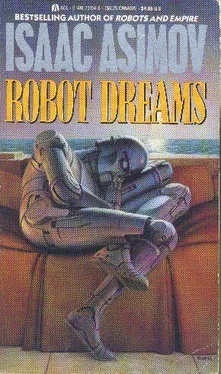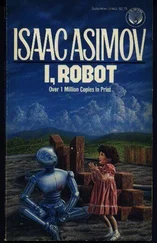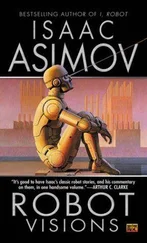Isaac Asimov - Robot Dreams
Здесь есть возможность читать онлайн «Isaac Asimov - Robot Dreams» весь текст электронной книги совершенно бесплатно (целиком полную версию без сокращений). В некоторых случаях можно слушать аудио, скачать через торрент в формате fb2 и присутствует краткое содержание. Город: New York, Издательство: Ace Books, Жанр: Фантастика и фэнтези, на английском языке. Описание произведения, (предисловие) а так же отзывы посетителей доступны на портале библиотеки ЛибКат.
- Название:Robot Dreams
- Автор:
- Издательство:Ace Books
- Жанр:
- Год:неизвестен
- Город:New York
- ISBN:нет данных
- Рейтинг книги:4 / 5. Голосов: 1
-
Избранное:Добавить в избранное
- Отзывы:
-
Ваша оценка:
- 80
- 1
- 2
- 3
- 4
- 5
Robot Dreams: краткое содержание, описание и аннотация
Предлагаем к чтению аннотацию, описание, краткое содержание или предисловие (зависит от того, что написал сам автор книги «Robot Dreams»). Если вы не нашли необходимую информацию о книге — напишите в комментариях, мы постараемся отыскать её.
Robot Dreams — читать онлайн бесплатно полную книгу (весь текст) целиком
Ниже представлен текст книги, разбитый по страницам. Система сохранения места последней прочитанной страницы, позволяет с удобством читать онлайн бесплатно книгу «Robot Dreams», без необходимости каждый раз заново искать на чём Вы остановились. Поставьте закладку, и сможете в любой момент перейти на страницу, на которой закончили чтение.
Интервал:
Закладка:
It wasn’t until after computers were invented and the public was made aware of their existence, that computers began to exist in my stories, and even then I didn’t truly conceive of the possibility of miniaturization. Yes, I spoke of rocket computers but I visualized them as scarcely more powerful than a slide rule.
But eventually I did grasp miniaturization – naturally, after the process had started. In "The Last Question" I began with my usual computer, Multivac, as large as a city, for I could only conceive a larger computer by imagining more and more vacuum tubes heaved into it. But then, in that story, I began miniaturizing and miniaturizing far beyond what I think there is any real possibility of.
However, I suspect the readers are always ready to forgive a poor science fiction writer getting to be out-of-date. As I said, my "Lucky Starr" books were not hurt for being out-of-date. As a matter.of fact, H.G. Wells’s The War of the Worlds is still read avidly, nearly a century after it was published and despite the incredibly false picture of Mars that it represents (false in the light of the Mars we know today). The pictures of Mars given by Edgar Rice Burroughs, a generation after Wells, and by Ray Bradbury even as late as the 1950s, are also in no way comparable to the real thing, and yet that doesn’t make it impossible to read A Princess on Mars or The Martian Chronicles, either.
That is because there is more to a science fiction story than the science it contains. There is also the story and if the science it contains is bent because of later discoveries, or because the plot absolutely demands the bending, we tend to forgive and overlook.
For instance, in my story "The Billiard Ball" I have a billiard ball enter a region of space in which it instantly assumes the speed of light. This is undoubtedly impossible, but even in terms of my bending of science, there is something more impossible. The billiard ball has a finite volume. Part of it enters the region first and that part instantly assumes the speed of light and breaks away from the rest. In short, the billiard ball must be reduced to atoms, or objects even less substantial, yet in the story it retains its integrity. My Conscience hurt me, but I just let it hurt and did what I had to do.
In "The Ugly Little Boy," I have a version of time travel and I firmly believe that time travel is impossible. However, I ignored that because the story is only tangentially about time travel. What it is really about is love.
Again I doubt that human beings will ever become living energy vortexes, though I present them as such in "Eyes Do More Than See," Who cares? The story is really about the beauty of material things.
I think you see what I am getting at. You may, in reading the following stories, find points in science that are inaccurate in themselves, or that are made inaccurate by subsequent advance. But if you write to tell me about it, please tell me also if you enjoyed the story anyway. You might not, of course, but I hope you will.
One more thing. My story collections are usually unillustrated and this doesn’t bother me, for I am not very visual. I am a wordman. Nevertheless, this collection is illustrated by Ralph McQuarrie and I must admit it adds immeasurably to the beauty of the book and even adds to the sense of the stories, by placing the reader into the proper visual attitude. The cover illustration, which inspired my story "Robot Dreams," written for this collection, is beautiful and humanizes a robot in a way I have never seen before. Perhaps none of this is terribly surprising, for Ralph is one of the best and most influential of all science fiction artists, having been involved with such blockbuster movies as "Star Wars" and "The Empire Strikes Back." In 1986 he won an Oscar for special effects for the film "Cocoon." I am so proud to have him part of this book.
Little Lost Robot
Measures on Hyper Base had been taken in a sort of rattling fury – the muscular equivalent of a hysterical shriek.
To itemize them in order of both chronology and desperation, they were:
All work on the Hyperatomic Drive through all the space volume occupied by the Stations of the Twenty-Seventh Asteroidal Grouping came to a halt.
That entire volume of space was nipped out of the System, practically speaking. No one entered without permission. No one left under any conditions.
By special government patrol ship, Drs. Susan Calvin and Peter Bogert, respectively Head Psychologist and Mathematical Director of United States Robot amp; Mechanical Men Corporation, were brought to Hyper Base.
Susan Calvin had never left the surface of Earth before, and had no perceptible desire to leave it this time. In an age of Atomic Power and a clearly coming Hyperatomic Drive, she remained quietly provincial. So she was dissatisfied with her trip and unconvinced of the emergency, and every line of her plain, middle-aged face showed it clearly enough during her first dinner at Hyper Base.
Nor did Dr. Bogert’s sleek paleness abandon a certain hangdog attitude. Nor did Major-general Kallner, who headed the project, even once forget to maintain a hunted expression. In short, it was a grisly episode, that meal, and the little session of three that followed began in a gray, unhappy manner.
Kallner, with his baldness glistening, and his dress uniform oddly unsuited to the general mood, began with uneasy directness.
"This is a queer story to tell, sir, and madam. I want to thank you for coming on short notice and without a reason being given. We’ll try to correct that now. We’ve lost a robot. Work has stopped and must stop until such time as we locate it. So far we have failed, and we feel we need expert help."
Perhaps the general felt his predicament anticlimactic. He continued with a note of desperation, "I needn’t tell you the importance of our work here. More than eighty percent of last year’s appropriations for scientific research have gone to us-"
"Why, we know that," said Bogert, agreeably. "U. S. Robots is receiving a generous rental fee for use of our robots."
Susan Calvin injected a blunt, vinegary note, "What makes a single robot so important to the project, and why hasn’t it been located?"
The general turned his red face toward her and wet his lips quickly, "Why, in a manner of speaking we have located it." Then, with near anguish, "Here, suppose I explain. As soon as the robot failed to report a state of emergency was declared, and all movement off Hyper Base stopped. A cargo vessel had landed the previous day and had delivered us two robots for our laboratories. It had sixty-two robots of the… uh… game type for shipment elsewhere. We are certain as to that figure. There is no question about it whatever."
"Yes? And the connection?"
"When our missing robot failed of location anywhere – I assure you we would have found a missing blade of grass if it had been there to find – we brainstormed ourselves into counting the robots left of the cargo ship. They have sixty-three now."
"So that the sixty-third, I take it, is the missing prodigal?" Dr. Calvin’s eyes darkened.
"Yes, but we have no way of telling which is the sixty-third."
There was a dead silence while the electric clock chimed eleven times, and then the robopsychologist said, "Very peculiar," and the corners of her lips moved downward.
"Peter," she turned to her colleague with a trace of savagery, "what’s wrong here? What kind of robots are they, using at Hyper Base?"
Dr. Bogert hesitated and smiled feebly, "It’s been rather a matter of delicacy till now, Susan."
She spoke rapidly, "Yes, till now. If there are sixty-three same-type robots, one of which is wanted and the identity of which cannot be determined, why won’t any of them do? What’s the idea of all this? Why have we been sent for?"
Читать дальшеИнтервал:
Закладка:
Похожие книги на «Robot Dreams»
Представляем Вашему вниманию похожие книги на «Robot Dreams» списком для выбора. Мы отобрали схожую по названию и смыслу литературу в надежде предоставить читателям больше вариантов отыскать новые, интересные, ещё непрочитанные произведения.
Обсуждение, отзывы о книге «Robot Dreams» и просто собственные мнения читателей. Оставьте ваши комментарии, напишите, что Вы думаете о произведении, его смысле или главных героях. Укажите что конкретно понравилось, а что нет, и почему Вы так считаете.








